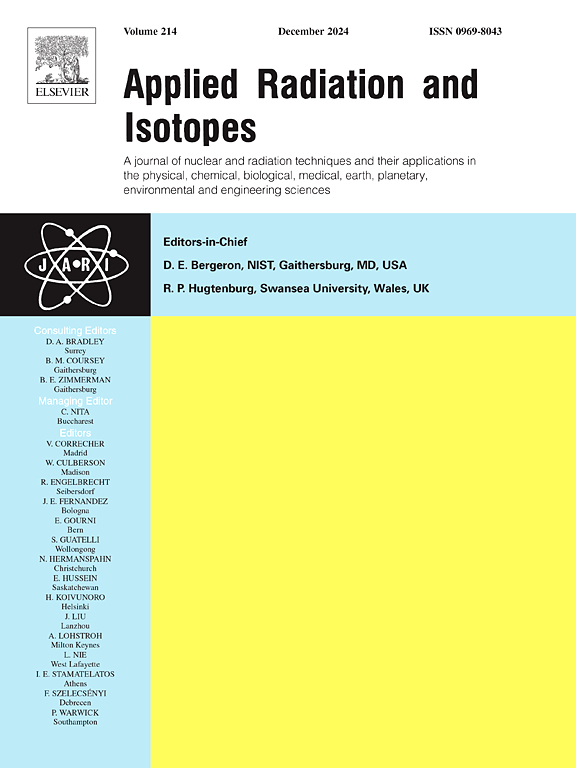Validation of chromatographic methods, TLC and HPLC, to quantify known radiochemical impurities and the radiochemical purity the radiopharmaceutical [177Lu]Lu-PSMA I&T
IF 1.6
3区 工程技术
Q3 CHEMISTRY, INORGANIC & NUCLEAR
引用次数: 0
Abstract
The Energy and Nuclear Research Institute (IPEN) is studying the production of the radiopharmaceutical [177Lu]Lu-PSMA I&T, in accordance with the good manufacturing practices recommended by the National Health Surveillance Agency (ANVISA), to be used in the therapy of prostate cancer. This work aims to validate chromatographic methods, Thin-Layer Chromatographic (TLC) and high-performance liquid chromatography (HPLC), to determine the radiochemical purity (RCP) of the product. The entire validation process of this work was based on ANVISA's RDC 166, 2017 and the Guide 10, version 1, 2017, guided the statistical treatments adopted. With the selectivity study we can observe that the presence of impurities or excess excipients in the sample does not interfere with the quantification of the product. The proposed methods were linear with linear correlation coefficients (r) above 0.99. The precision and repeatability presented relative standard deviation values lower than specified (RSD <5 %). The small controlled variations in the method suggested for the robustness test also did not affect the radiochemical purity of the product. In view of the results and in accordance with the criteria established by the National Health Surveillance Agency (ANVISA), the two chromatographic methods were validated in accordance with RDC 166, 2017, proving to be selective, precise, linear and robust. The validation of TLC and HPLC methods enables their application in the batch release routine of the new radiopharmaceutical at Radiopharmacy Center of IPEN.
验证色谱法(TLC 和 HPLC),以量化已知放射性化学杂质和放射性药物[177Lu]Lu-PSMA I&T 的放射性化学纯度
能源与核研究所(IPEN)正在研究按照国家卫生监督局(ANVISA)建议的良好生产规范生产放射性药物[177Lu]Lu-PSMA I&T,用于治疗前列腺癌。这项工作旨在验证薄层色谱 (TLC) 和高效液相色谱 (HPLC) 等色谱方法,以确定产品的放射化学纯度 (RCP)。这项工作的整个验证过程以 ANVISA 的 RDC 166(2017 年)和《指南 10》(2017 年第 1 版)为基础,指导所采用的统计处理方法。通过选择性研究,我们可以发现样品中的杂质或过量辅料不会干扰产品的定量。所建议的方法具有线性关系,线性相关系数(r)高于 0.99。精确度和重复性的相对标准偏差值低于规定值(RSD <5%)。为进行稳健性测试而建议的方法中的微小可控变化也没有影响产品的放射化学纯度。鉴于上述结果,并根据国家卫生监督局(ANVISA)制定的标准,按照 RDC 166(2017 年)对两种色谱方法进行了验证,证明它们具有选择性、精确性、线性和稳健性。TLC 和 HPLC 方法的验证使其能够应用于 IPEN 放射药中心新放射性药物的批量放行程序。
本文章由计算机程序翻译,如有差异,请以英文原文为准。
求助全文
约1分钟内获得全文
求助全文
来源期刊

Applied Radiation and Isotopes
工程技术-核科学技术
CiteScore
3.00
自引率
12.50%
发文量
406
审稿时长
13.5 months
期刊介绍:
Applied Radiation and Isotopes provides a high quality medium for the publication of substantial, original and scientific and technological papers on the development and peaceful application of nuclear, radiation and radionuclide techniques in chemistry, physics, biochemistry, biology, medicine, security, engineering and in the earth, planetary and environmental sciences, all including dosimetry. Nuclear techniques are defined in the broadest sense and both experimental and theoretical papers are welcome. They include the development and use of α- and β-particles, X-rays and γ-rays, neutrons and other nuclear particles and radiations from all sources, including radionuclides, synchrotron sources, cyclotrons and reactors and from the natural environment.
The journal aims to publish papers with significance to an international audience, containing substantial novelty and scientific impact. The Editors reserve the rights to reject, with or without external review, papers that do not meet these criteria.
Papers dealing with radiation processing, i.e., where radiation is used to bring about a biological, chemical or physical change in a material, should be directed to our sister journal Radiation Physics and Chemistry.
 求助内容:
求助内容: 应助结果提醒方式:
应助结果提醒方式:


